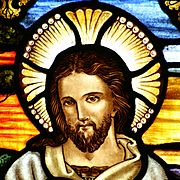Christian philosophy facts for kids
Christian philosophy is about how Christians think about big questions. It mixes ideas from philosophy with beliefs from Christianity. Early thinkers wanted to see how science and faith could work together. Some, like Origen of Alexandria and Augustine, thought they fit well. Others, like Tertullian, saw problems.
Some people wonder if "Christian philosophy" is truly new. They say many ideas came from ancient Greek philosophy. But others, like Boehner and Gilson, believe it's more than just old ideas. They say Christian philosophy kept Greek thinking alive in new ways.
Contents
A Look Back: How Christian Philosophy Grew
Christian philosophy started around the 200s AD. This was during a time called Patristics. Early Christian writers, known as Church Fathers, wanted to defend their faith. As Christianity spread, these writers learned from the Roman Empire's philosophical schools. They used these ideas to explain Jesus Christ as God. Many think Origen of Alexandria was the first to fully show Christian philosophy. He presented it as a strong alternative to other ways of thinking.
From the 1000s to the 1400s, Christian philosophy was seen through Scholasticism. This was a big part of medieval philosophy. After the 1500s, Christian philosophy continued. But it also shared ideas with new scientific and philosophical theories.
Christian ideas brought new ways of thinking compared to the Greeks. This is because Christian philosophy starts with the Christian religious message.
Historian T. Adão Lara divides Christian philosophy into three main times:
- Early philosophy: Patristics (2nd–7th centuries)
- Medieval philosophy: Scholastics (9th–13th centuries)
- Pre-modern (14th–15th centuries)
What Makes Christian Philosophy Unique?
Christian philosophy has special ways of looking at the world. It tries to understand things using both reason and faith.
Using Logic and Reason
Christian philosophy starts with logic and reason. But it also connects to Christian theology. If an idea comes from religious teachings, it's theology. If it comes from pure reason, it's philosophy. Christian philosophy uses reason to explore deep questions.
Explaining Faith with Reason
A main goal of Christian philosophy is to make religious beliefs clear using natural reason. Christian thinkers use their faith to understand the world. Unlike some other philosophers, they look for eternal truth. Their thinking is shaped by their religion.
Some people have questioned Christian philosophy. They wonder how philosophy, which asks questions, can work with religion, which has set beliefs. But even with religious rules, there were many important philosophical ideas in the Middle Ages.
Building on Past Ideas
Christian philosophy grew from earlier ways of thinking. It took ideas from Greek philosophy. It also learned from Jewish philosophy and Islamic philosophy. This shows that Christian Europe was open to ideas from other cultures.
A Complete View of the World
Christian philosophy tries to understand all parts of reality. It looks at the world as one big, connected system. Christian beliefs help give thinkers a full picture.
See also
 In Spanish: Filosofía cristiana para niños
In Spanish: Filosofía cristiana para niños
- Arguments for the existence of God
- Biblical studies
- Christian apologetics
- Christian humanism
- Catholic theology
- Ethics in the Bible
- Judeo-Christian ethics
- Sobornost
- Theism
- Thomism
 | George Robert Carruthers |
 | Patricia Bath |
 | Jan Ernst Matzeliger |
 | Alexander Miles |


